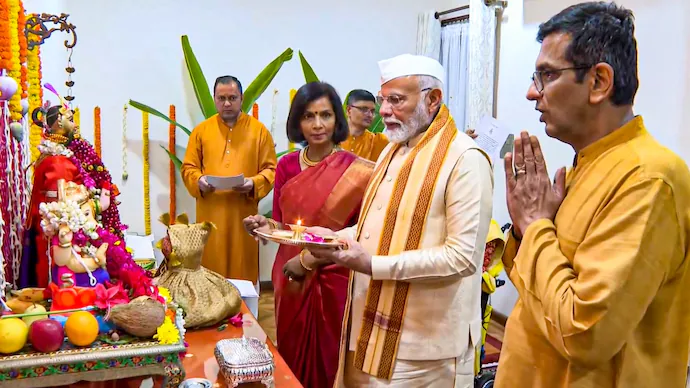Judicial Independence Under Scrutiny: Ex-Judges Join BJP, VHP, as CJI Hosts Modi

New Delhi: As the political landscape heats up ahead of state elections, a significant trend is emerging: the judiciary is transitioning into active politics. In a recent move, former Supreme Court Justice Hemant Gupta, known for his ruling on Karnataka’s hijab (veil) ban, stirred controversy after attending an event of the Vishwa Hindu Parishad (VHP), signaling a possible alignment with right-wing interests. While talking to The Quint, Gupta responded he has the right to attend discussions on national issues as a citizen. A report by The Indian Express revealed that around 30 retired judges from the Supreme Court and various high courts attended the event.
According to VHP sources, who spoke anonymously to The Quint, the gathering at the India Habitat Centre in New Delhi addressed several contentious issues, including religious conversions, cow protection, temple-mosque disputes in Varanasi and Mathura and the “persecution” of Hindu minorities in neighboring countries.
Simultaneously, former Madhya Pradesh High Court judge Rohit Arya officially joined the the Hindu nationalist Bharatiya Janata Party (BJP), bolstering the party’s legal expertise. Justice Arya, who has been in the spotlight for various rulings over the years, garnered significant attention in 2021 when he denied bail to comedians Munawar Faruqui and Nalin Yadav. The two were arrested in Indore that year on charges of allegedly offending religious sentiments.
Another significant addition is Abhijit Gangopadhyay, whose anti-corruption rulings made him a figurehead, now taking a stance against the Trinamool Congress (TMC) in West Bengal. In April of the previous year, he attracted controversy by discussing the ‘school jobs for cash scam’ case in a TV interview. His comments, particularly regarding TMC General Secretary Abhishek Banerjee’s alleged involvement, faced criticism from the Supreme Court, which admonished sitting judges for speaking to the media.
Adding to the list, Sunil Sangwan, a former prison official who granted multiple paroles to self-style godman Ram Rahim, a rape convict, is on the BJP’s first list of 67 candidates for Haryana Assembly election, particularly for the Dadri seat, reports NDTV. His history with the Dera Sacha Sauda chief raises eyebrows about the intersection of electoral politics and legal history. These moves reflect a deeper merging of legal influence into India's electoral and party strategies.
The phenomenon of former judges joining political parties raises critical questions about the role of the judiciary in politics and whether this might impact the perception of judicial neutrality in a polarised political climate. The interplay between Indian politics, the judiciary, and the economy is a complex and dynamic relationship that shapes the trajectory of the nation.
Adding to these concerns, Prime Minister Narendra Modi recently participated in a Ganpati Puja at the residence of Chief Justice of India DY Chandrachud, raising questions about the judiciary’s independence. This move has raised concerns among legal experts and political opponents regarding judicial independence.
Veteran lawyer Indira Jaising criticised this event, stating that the CJI had compromised the separation of powers and called on the Bar Association of India to condemn the apparent blurring of lines between the judiciary and the executive. The criticism from prominent legal figures underscores the broader concerns about judicial neutrality in an increasingly polarised political landscape. “That is the state of the republic….ladies and gentlemen. Jai Hind,” reads a post by RJD Rajya Sabha MP Manoj Jha.
Advocate Jaising also urged the Supreme Court Bar Association (SCBA) to condemn the move publicly and described it as a “publicly displayed compromise” of the CJI’s independence from the executive. The political realm has echoed similar concerns. Shiv Sena (Uddhav Balasaheb Thackeray) leader Sanjay Raut questioned the appropriateness of Chandrachud hosting Prime Minister Modi, especially given the ongoing cases involving the Maharashtra government that are currently under the CJI’s purview. Raut’s remarks reflect growing apprehensions about potential conflicts of interest and the need for maintaining judicial impartiality in high-profile political cases.
